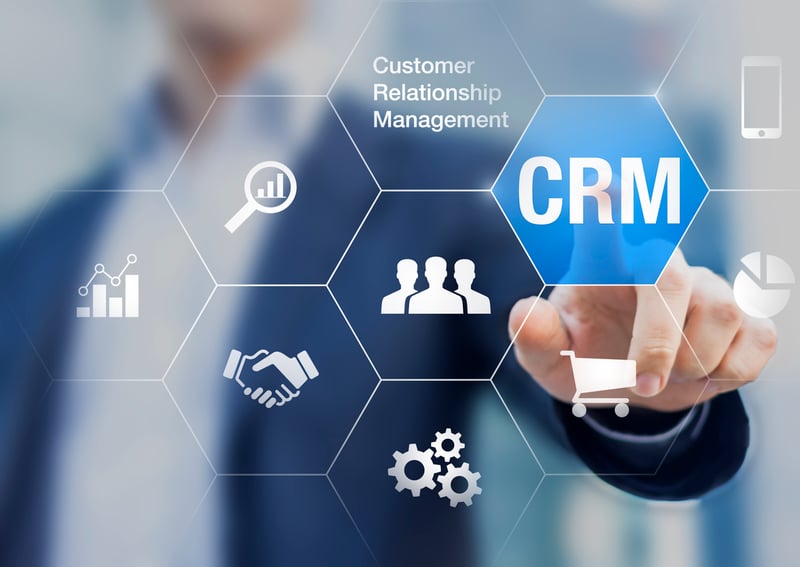
CRM Database Guide: Types, Benefits, Data Migration
 Updated on
Updated on
 By Bradley Kovacs
By Bradley Kovacs
Bradley Kovacs
Bradley has been passionate about technology since childhood, starting with Microsoft Flight Simulator at age six. In college, he automated his data e...
learn more
Bradley Kovacs
Bradley has been passionate about technology since childhood, starting with Microsoft Flight Simulator at age six. In college, he automated his data e...
Table of Contents
Table of Contents
Picture this, your workmate calls in sick, leaving you to chase up on their leads.
Apparently, they've almost closed a deal with one of them. But which one?
Companies keep great records of their customers' data…
But without an effective data retrieval system, finding something remains a nightmare.
We've all gone through this at some point. Trying to sort through endless files or having to ravage a workmate's PC while trying to find a single contact.
This is where CRM databases enter the scene – making info access a breeze and stopping you from turning into this guy.
And, as an added plus, CRM databases also enable you to keep customers engaged no matter where they are in the sales funnel.
Like what you're reading?
Then keep scrolling, and we'll take you through CRM software databases, their benefits, types, and data migration best practices.
Let's go!
What Is a CRM Database?
A CRM database, or customer relationship management database, is a centralized system that stores and organizes all the information your business collects about customers, leads, and prospects.
In simple terms, it's the engine that powers your CRM software, keeping every customer interaction, transaction, and communication neatly recorded in one accessible place.
Instead of having customer info scattered across spreadsheets, inboxes, and sticky notes, a customer relationship management database consolidates everything. It tracks every interaction, purchase, and preference, linking it all to a specific customer. This 360-degree view is what separates a modern CRM from a simple contact list.
The impact is significant. Research from Nucleus shows that for every dollar spent on CRM, companies get an average return of $8.71. That ROI doesn't come from just storing data; it comes from using it effectively.
How is This Different from a Traditional Database?
That's a fair question. Isn't a Microsoft SQL server or even a complex Excel file a database?
Yes, but the difference is purpose.
A traditional database is like a digital warehouse. It's fantastic at storing massive amounts of data (like sales_order_#8675309). It's the "back end" that requires a technical user to find specific, transactional information.
A customer relationship management database is like the smart, friendly "front office" built on top of that warehouse. It's designed for non-technical users (like sales and marketing teams) to manage relationships, not just data points.
- Traditional Databases (like SQL) are optimized for storage and transactions. You ask it, "Show me transaction #8675309."
- Database CRM Software is optimized for access and relationships. You ask it, "Show me all customers in New York who haven't bought in six months but have opened our last email."
The CRM database connects the dots, turning raw data into customer intelligence.
Types of CRM Databases

Not all CRM databases are built the same. The "engine" we talked about can live in different places, and choosing the right one depends on your budget, tech resources, and how much control you want.
Here's a quick breakdown of the main types:
|
Type |
Data Location |
Best For |
|
On-Premise |
Your company's own servers |
Enterprises with strict security/compliance needs |
|
Cloud-Based (SaaS) |
The vendor's servers (online) |
Most businesses (startups to large teams) |
|
Open Source |
Your choice (self-hosted) |
Tech-savvy companies wanting deep customization |
|
Hybrid |
A mix of on-premise & cloud |
Businesses in transition or with unique data needs |
And now let's take a deep dive into each one:
1. On-Premise CRM Database
This is the traditional "castle-and-moat" approach. You buy the database CRM software and install it on your own servers, located in your building.
Your IT team is 100% responsible for everything: security, maintenance, updates, and backups. This gives you complete control over your customer relationship management databases, which is a must-have for some industries (like finance or healthcare) with strict data privacy regulations.
The trade-off? It's expensive upfront and requires a dedicated IT staff to keep it running.
2. Cloud-Based CRM Database (SaaS)
This is the one you probably hear about most, and for good reason. Cloud CRM databases (also known as Software-as-a-Service or SaaS) are hosted by the CRM provider (think Ringy, Salesforce, HubSpot, or Zoho) in their own secure data centers.
You just pay a subscription fee (usually per user, per month) and access your CRM through a web browser or mobile app.
- Scalability: You can add or remove users with a click.
- Cost Savings: No servers to buy, no maintenance team to hire. This model dominates the market, with cloud CRM solutions accounting for over 75% of all CRM spending.
- Accessibility: Your team can log in from anywhere with an internet connection.
The "con" is that you're reliant on the vendor for security and uptime, though top-tier providers have security far more robust than most small businesses could build themselves.
3. Open Source CRM Database Software
An open source CRM is the "build-it-yourself" kit. The CRM software database source code is free and available to the public. You can download it, install it on your own servers (or a private cloud), and customize it to your heart's content.
If you want your CRM to do something hyper-specific that no off-the-shelf product offers, this is your solution. The catch? "Free" doesn't mean "no cost." You need skilled developers to install, customize, and maintain it, which can be more expensive and time-consuming than a cloud solution in the long run.
4. Hybrid CRM Databases
Just like it sounds, a hybrid approach is a mix of on-premise and cloud.
Why would anyone do this? A company might use on-premise CRM databases to store its core, highly sensitive customer financial records (to satisfy a regulator) but then "sync" its sales and marketing team's activity using a flexible, user-friendly cloud CRM.
Hybrid CRM databases offer a balance of security and flexibility, but it can be complex to make two different systems talk to each other seamlessly.
Benefits of CRM Databases

Alright, so we know what a CRM database is. But what's the "why"? Why rip your team away from their beloved (and chaotic) spreadsheets?
The "why" is all about turning that data chaos into business momentum. The right CRM software database isn't just a cost; it's an investment that pays for itself.
Here's how a powerful customer relationship management database can transform your sales, marketing, and customer experience.
1. Centralized Customer Data
This is the big one. Your customer relationship management database becomes the "single source of truth" for your entire company.
No more digging through inboxes to find out what marketing sent, asking sales what they last discussed, or checking support tickets to see if a customer is happy. Everyone, from the CEO to the new sales intern, looks at the same, up-to-date customer profile. It ends the "who has the latest info?" panic.
2. Improved Sales & Marketing Alignment
This benefit is a sanity-saver. A shared CRM database is the peace treaty in the long-standing war between sales and marketing.
- Marketing uses the database to see which leads actually turn into revenue. They can then refine their campaigns and segment audiences with laser precision, sending hotter, more qualified leads to sales.
- Sales can see the entire marketing journey of a lead, what emails they opened, what web pages they visited. This context means no more "cold" warm calls. It's a seamless handoff that stops leads from falling through the cracks.
3. Automation & Efficiency
A modern CRM database does work for you. It's packed with automation tools that eliminate mind-numbing manual tasks. Think about:
- Automatically sending a welcome email to a new lead.
- Creating a task for a salesperson to follow up 3 days after sending a proposal.
- Notifying a manager if a high-value deal has stalled.
This is what database CRM software excels at. It frees up your team from data entry so they can spend more time selling, marketing, and helping customers.
4. Customer Insights & Reporting
Data is useless if you can't understand it. A CRM database is also a powerful analytics engine.
In seconds, you can pull reports that show your sales pipeline, track key performance indicators (KPIs) like conversion rates, and identify your most profitable customer segments. Instead of guessing what's working, you know. This allows leaders to make strategic, data-driven decisions instead of just going with their gut.
5. Enhanced Customer Relationships
This is the ultimate goal, right? It's right there in the name: customer relationship management.
When you have all the data, alignment, automation, and insights, the result is a better customer experience.
- Your team can have personalized conversations because they know the customer's entire history.
- Your support agents can solve problems faster because they see the full context.
This personalized touch is no longer just a "nice to have"; it's critical. Happy customers stay longer, buy more, and refer their friends. In fact, studies show that improving customer retention by just 5% can increase profits by 25% to 95%. That's the real power of CRM databases.
Data Migration: Steps to Getting Started with a CRM Database
Data migration is the one part of getting a new CRM database that everyone dreads. It's the digital equivalent of moving houses, and it's tempting to just throw all your old junk in boxes and deal with it later.
Don't.
Your new customer relationship management database is only as good as the data you put into it. This is your one chance for a fresh, clean start. Here's how to do it right.
Step 1: Audit Your Existing Customer Data
Before you can move, you need to know what you have. Your customer data is probably scattered everywhere. It's time to find it all:
- Spreadsheets: The sales team's "master" (and 15 other "final_v2") contact lists.
- Legacy Systems: That old access database or industry-specific software.
- Email Lists: Your marketing platform (like Mailchimp) and even individual Outlook or-Gmail contacts.
- Accounting Software: Customer billing addresses and purchase history.
Once you know where it all lives, you can decide what's worth moving, what can be archived, and what needs to be thrown out.
Step 2: Cleanse and Standardize Data
This is the most critical step. If you skip this, you're just moving your mess from an old house to a new one. Remember: Garbage In, Garbage Out (GIGO).
Bad data is shockingly expensive. Research has shown that bad data can cost companies an average of 12% of their total revenue. This is your chance to fix that, and here's how to do it:
- Remove Duplicates: Find all the "Jon Smith," "J. Smith," and "Jonathan Smith" entries for the same person and merge them.
- Fix Errors: Correct typos ("john@gmal.com"), missing fields, and outdated information.
- Normalize Fields: Standardize your data. Make sure "State" is always "CA" and not "Calif." or "California." Make sure job titles are consistent. This is essential for accurate reporting later.
Step 3: Map Data Fields
Data mapping is simply telling your new database CRM software where to put your old data.
You're creating a simple map: The "Company Name" column from your spreadsheet needs to go into the "Account Name" field in the new CRM database. The "Contact" column goes into the "Contact Name" field. It sounds basic, but getting this map right ensures that when you flip the switch, your data ends up in the right "rooms."
Step 4: Migrate Data
Time to make the move. You have two main strategies:
- Phased Upload: You move data in chunks. For example, you migrate the marketing team first, let them test it, and then migrate the sales team. This is slower but safer.
- Bulk Upload (or "Big Bang"): You move everything at once, usually over a weekend. It's faster and gets everyone on the new system at the same time, but it's higher risk if something goes wrong.
Most CRM software database providers (like HubSpot or Salesforce) have built-in import tools to help with this, but for complex moves, you may need a specialist.
Step 5: Validate and Test
The moving truck has left, and the boxes are in the rooms. Now you have to check if anything broke.
Immediately after the migration, run tests. Pull a list of your top 100 customers from the old system and compare it to the new one. Are all the contacts there? Is the purchase history correct? Are any notes missing? Don't assume it all worked perfectly. Trust, but verify.
Step 6: Train Teams on the New CRM Software Database
You can have the world's cleanest, most expensive CRM database, but it's worthless if your team doesn't know how to use it (or why they should).
Training is non-negotiable. Show them how the new system makes their specific job easier.
- For sales: "Here's how you can log a call in 10 seconds."
- For marketing: "Here's how you can build a list of all customers who bought 'Product A' but not 'Product B'."
Adoption is the final, and most important, hurdle.
Here's your CRM migration checklist:
|
Phase |
Key Tasks |
|
Pre-Migration |
Audit existing data, remove duplicates, standardize formats, back up all records |
|
During Migration |
Map fields accurately, test sample uploads, monitor transfer logs |
|
Post-Migration |
Validate accuracy, fix missing data, train teams, monitor early usage |
A well-planned migration doesn't just move data. It sets the foundation for CRM databases that supports long-term growth, cleaner workflows, and more reliable customer insights.
Tips to Optimize Your CRM Data

You've successfully moved into your new "data house." Fantastic. Now, how do you keep it from turning back into that digital junk drawer?
A CRM database is not a "set it and forget it" tool. It's a living garden, and needs regular weeding and feeding to produce results. Here are the essential habits for keeping your customer relationship management database in peak condition.
Establish Data Governance Rules
This sounds corporate and boring, but it's the single most important habit. It just means deciding who can do what.
You need to define:
- Ownership: Who is ultimately responsible for the data's accuracy? Is it the sales rep, their manager, or a data admin?
- Permissions: Don't give everyone admin access. A new sales rep probably shouldn't be able to mass-delete 10,000 contacts. (You'd be surprised.)
- Update Schedules: How often must a rep update a deal in the pipeline? Daily? Weekly? Set the standard so "stale" deals don't clog your forecast.
Implement Regular Data Cleansing
Data decays. It's a fact of life. People change jobs, companies change names, and email addresses are abandoned. Research shows that B2B contact data can decay at a rate of up to 70.3% per year.
Set a recurring calendar event, monthly or quarterly, for a "Data Health Check." Use your CRM's built-in tools to find and merge duplicates, bulk-update contacts with no recent activity, and clear out obvious junk entries.
Automate Data Entry
The biggest enemy of clean CRM databases is human error (and laziness). The best way to fight it is to remove the human from the equation as much as possible.
Manual data entry is a top complaint from sales teams. Automating it is a massive win. The following is how you can automate data entry with a CRM database:
- Integrate your web forms so new leads are created automatically.
- Sync your email and calendar so meetings and conversations are logged without a click.
- Use business card scanner apps or AI-powered tools to import new contacts flawlessly.
Use CRM Database Reporting Tools
Your CRM software database is a goldmine of insights, but you have to dig for them. Use your reporting dashboards as your treasure map.
Set up dashboards that track the KPIs that matter to you. This isn't just about the final sale; it's about the health of the process.
- Lead Quality: Which marketing campaigns are sending leads that actually close?
- Sales KPIs: What's your team's average deal size? How long is your sales cycle?
- Data Health: Create a report that shows "Contacts with no phone number" or "Deals with no next activity set." This gives you a clear, actionable to-do list for your data cleansing.
Integrate with Other Systems
Your database CRM software should be the central hub, not an isolated island. The more you connect your other tools to it, the more powerful it becomes.
Integrating your systems ensures that all data flows back to the central customer record.
- Marketing Automation: See every email open, link click, and webinar attendance.
- Calling Tools: Log every call, recording, and outcome automatically.
- Support Tickets: Give sales visibility if their top prospect has an open support ticket before they call to upsell them.
Monitor Usage & Adoption
This is the ultimate test. A perfect CRM database that no one uses is just an expensive, empty warehouse.
Low user adoption is the #1 reason CRM projects fail. You have to monitor it. Most CRMs have built-in reports to show you "last login date" or "new contacts created" by the user.
If you see a sales rep hasn't logged in for two weeks, you can address it immediately. Find out why. Do they need more training? Do they find it too slow? Consistent use of the customer relationship management database is the only way to get that juicy $8.71 ROI we talked about earlier.
Final Words on CRM Databases
CRM databases help sales teams organize and centralize all customer and lead data in one place – while also speeding up essential functions like finding conversation history, adding leads to marketing campaigns, and even calling your contacts.
CRM software solutions, like Ringy, are designed to support your team, enhance performance, and bridge the gap between lead nurturing and closing the deal.
Whether you are a startup or an established firm, Ringy provides your business with state-of-the-art features at competitive prices.
So contact Ringy today to request a demo or try Ringy for free to learn more about our CRM!

Skyrocket your sales with the CRM that does it all.
Calling? Check. SMS? Check. Automation and AI? Check. Effortlessly keep in touch with your customers and boost your revenue without limits.

Take your sales to new heights with Ringy.
Sales in a slump? Ringy gives you the tools and flexibility you need to capture leads, engage with them, and turn them into customers.
Subscribe to Our Blog
Enter your email to get the latest updates sent straight to your inbox!
Categories
Related Articles




































































































